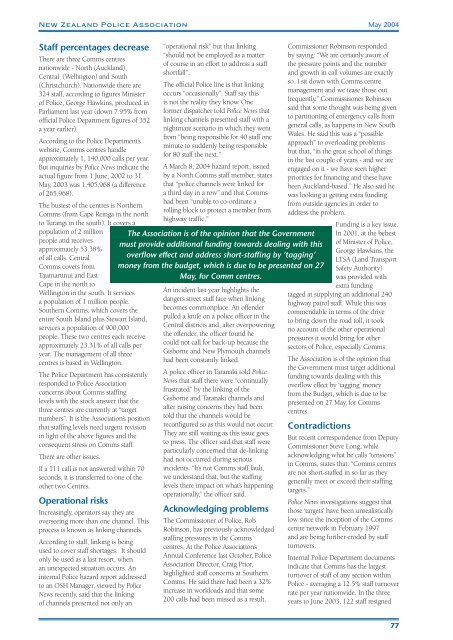Police News May - New Zealand Police Association
Police News May - New Zealand Police Association
Police News May - New Zealand Police Association
You also want an ePaper? Increase the reach of your titles
YUMPU automatically turns print PDFs into web optimized ePapers that Google loves.
<strong>New</strong> <strong>Zealand</strong> <strong>Police</strong> <strong>Association</strong><strong>May</strong> 2004Staff percentages decreaseThere are three Comms centresnationwide - North (Auckland),Central (Wellington) and South(Christchurch). Nationwide there are324 staff, according to figures Ministerof <strong>Police</strong>, George Hawkins, produced inParliament last year (down 7.95% fromofficial <strong>Police</strong> Department figures of 352a year earlier).According to the <strong>Police</strong> Department’swebsite, Comms centres handleapproximately 1, 140,000 calls per year.But inquiries by <strong>Police</strong> <strong><strong>New</strong>s</strong> indicate theactual figure from 1 June, 2002 to 31<strong>May</strong>, 2003 was 1,405,968 (a differenceof 265,968).The busiest of the centres is NorthernComms (from Cape Reinga in the northto Turangi in the south). It covers apopulation of 2 millionpeople and receivesapproximately 53.38%of all calls. CentralComms covers fromTaumarunui and EastCape in the north toWellington in the south. It servicesa population of 1 million people.Southern Comms, which covers theentire South Island plus Stewart Island,services a population of 900,000people. These two centres each receiveapproximately 23.31% of all calls peryear. The management of all threecentres is based in Wellington.The <strong>Police</strong> Department has consistentlyresponded to <strong>Police</strong> <strong>Association</strong>concerns about Comms staffinglevels with the stock answer that thethree centres are currently at “targetnumbers”. It is the <strong>Association</strong>’s positionthat staffing levels need urgent revisionin light of the above figures and theconsequent stress on Comms staff.There are other issues.If a 111 call is not answered within 70seconds, it is transferred to one of theother two Centres.Operational risksIncreasingly, operators say they areoverseeing more than one channel. Thisprocess is known as linking channels.According to staff, linking is beingused to cover staff shortages. It shouldonly be used as a last resort, whenan unexpected situation occurs. Aninternal <strong>Police</strong> hazard report addressedto an OSH Manager, viewed by <strong>Police</strong><strong><strong>New</strong>s</strong> recently, said that the linkingof channels presented not only an“operational risk” but that linking“should not be employed as a matterof course in an effort to address a staffshortfall”.The official <strong>Police</strong> line is that linkingoccurs “occasionally”. Staff say thisis not the reality they know. Oneformer dispatcher told <strong>Police</strong> <strong><strong>New</strong>s</strong> thatlinking channels presented staff with anightmare scenario in which they wentfrom “being responsible for 40 staff oneminute to suddenly being responsiblefor 80 staff the next.”A March 8, 2004 hazard report, issuedby a North Comms staff member, statesthat “police channels were linked fora third day in a row” and that Commshad been “unable to co-ordinate arolling block to protect a member fromhighway traffic.”The <strong>Association</strong> is of the opinion that the Governmentmust provide additional funding towards dealing with thisoverflow effect and address short-staffing by ‘tagging’money from the budget, which is due to be presented on 27<strong>May</strong>, for Comm centres.An incident last year highlights thedangers street staff face when linkingbecomes commonplace. An offenderpulled a knife on a police officer in theCentral districts and, after overpoweringthe offender, the officer found hecould not call for back-up because theGisborne and <strong>New</strong> Plymouth channelshad been constantly linked.A police officer in Taranaki told <strong>Police</strong><strong><strong>New</strong>s</strong> that staff there were “continuallyfrustrated” by the linking of theGisborne and Taranaki channels andafter raising concerns they had beentold that the channels would bereconfigured so as this would not occur.They are still waiting as this issue goesto press. The officer said that staff wereparticularly concerned that de-linkinghad not occurred during seriousincidents. “It’s not Comms staff fault,we understand that, but the staffinglevels there impact on what’s happeningoperationally,” the officer said.Acknowledging problemsThe Commissioner of <strong>Police</strong>, RobRobinson, has previously acknowledgedstaffing pressures in the Commscentres. At the <strong>Police</strong> <strong>Association</strong>’sAnnual Conference last October, <strong>Police</strong><strong>Association</strong> Director, Craig Prior,highlighted staff concerns at SouthernComms. He said there had been a 32%increase in workloads and that some200 calls had been missed as a result.Commissioner Robinson respondedby saying: “We are certainly aware ofthe pressure points and the numberand growth in call volumes are exactlyso. I sit down with Comms centremanagement and we tease those outfrequently.” Commissisoner Robinsonsaid that some thought was being givento partitioning of emergency calls fromgeneral calls, as happens in <strong>New</strong> SouthWales. He said this was a “possibleapproach” to overloading problemsbut that, “in the great school of thingsin the last couple of years - and we areengaged on it - we have seen higherpriorities for financing and these havebeen Auckland-based.” He also said hewas looking at getting extra fundingfrom outside agencies in order toaddress the problem.Funding is a key issue.In 2001, at the behestof Minister of <strong>Police</strong>,George Hawkins, theLTSA (Land TransportSafety Authority)was provided withextra fundingtagged at supplying an additional 240highway patrol staff. While this wascommendable in terms of the driveto bring down the road toll, it tookno account of the other operationalpressures it would bring for othersectors of <strong>Police</strong>, especially Comms.The <strong>Association</strong> is of the opinion thatthe Government must target additionalfunding towards dealing with thisoverflow effect by ‘tagging’ moneyfrom the Budget, which is due to bepresented on 27 <strong>May</strong>, for Commscentres.ContradictionsBut recent correspondence from DeputyCommissioner Steve Long, whileacknowledging what he calls “tensions”in Comms, states that: “Comms centresare not short-staffed in so far as theygenerally meet or exceed their staffingtargets.”<strong>Police</strong> <strong><strong>New</strong>s</strong> investigations suggest thatthose ‘targets’ have been unrealisticallylow since the inception of the Commscentre network in February 1997and are being further eroded by staffturnovers.Internal <strong>Police</strong> Department documentsindicate that Comms has the largestturnover of staff of any section within<strong>Police</strong> - averaging a 12.5% staff turnoverrate per year nationwide. In the threeyears to June 2003, 122 staff resigned77
















